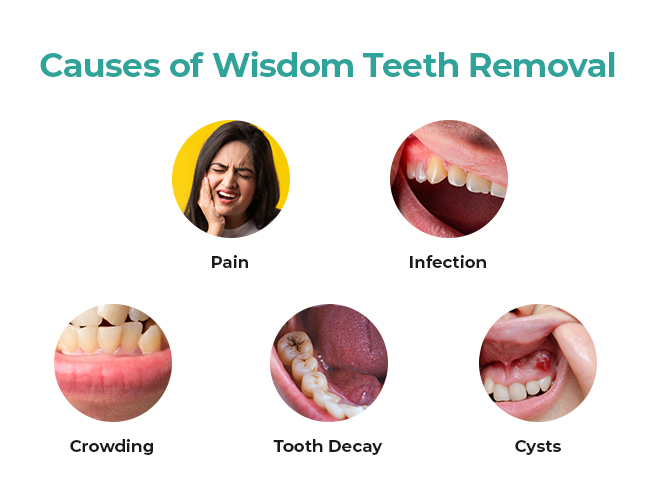
Should You Remove Your Wisdom Teeth?
Should You Remove Your Wisdom Teeth?
Wisdom teeth, the third and final set of molars located at the very back of your mouth, have long been a source of frustration for many adults. While some people can keep their wisdom teeth without issue, most end up needing to have them removed at some point due to associated problems like pain, infection, and crowding issues. If you are wondering whether it is necessary to remove your wisdom teeth, you are not alone. Here is a look at why wisdom tooth extraction is often recommended, who needs it, and what to expect from the procedure when performed by an experienced dentist.
Should You Keep Your Wisdom Teeth?
While most wisdom teeth ultimately require removal, there are some benefits of keeping wisdom teeth:
- Wisdom teeth may help replace lost molars. Keeping healthy wisdom teeth gives you an extra set of chewing surfaces.
- It avoids the risks of wisdom tooth removal surgery. While rare, nerve damage or other complications can potentially occur.

What Are Wisdom Teeth and Why Do They Cause Problems?
Wisdom teeth usually erupt sometime between the ages of 17 and 25. They get their name from the fact that they come in later in life when a person has supposedly gained more wisdom. While that is a nice idea, wisdom teeth frequently cause issues due to their location and the fact that there often is not enough room for them. The most common problems associated with wisdom teeth include
Pain: As wisdom teeth try to push through the gums, it can cause pain and swelling. The discomfort is sometimes chronic if the tooth becomes impacted or only partially emerges.
Infection: Bacteria can get trapped under the gums around an erupting wisdom tooth. This can lead to infections like pericoronitis.
Crowding: Often, wisdom teeth come in crooked or at an angle because the jaw has stopped growing and there is not enough room. This can damage adjacent teeth and alter your bite.
Tooth Decay: Wisdom teeth are difficult to clean and may develop cavities that can spread to other teeth.
Cysts: Non-cancerous cysts sometimes form around impacted wisdom teeth, destroying nearby bones and tissues.
The Need for Wisdom Teeth Removal
If your wisdom teeth are fully erupted, properly positioned, cavity-free, easy to clean, and not causing any problems, you may be able to keep them. However, most dentists recommend removing problematic wisdom teeth or ones with a high chance of causing issues. There is no exact wisdom teeth removal age, you should have a dental evaluation to determine if your wisdom teeth should come out, if you have any symptoms, or if x-rays show:
- Partially erupted or impacted wisdom teeth
- Wisdom teeth improperly angled toward other teeth
- Lack of sufficient space for wisdom teeth
- Nearby gum disease or tooth decay
- Cysts forming around wisdom teeth
Wisdom teeth removal is sometimes recommended for orthodontic reasons to prevent wisdom teeth from undoing bite correction.
What is Wisdom Tooth Removal?
Wisdom teeth removal is a very common dental procedure. The dentist at the best dental hospital in Calicut will numb the area so you don’t feel any pain. There are two main methods for removing wisdom teeth:
Simple Extraction
This involves numbing the area and gently rocking the visible tooth until it comes free. This is only an option if the wisdom tooth is fully erupted and has relatively normal positioning.
Surgical Extraction
This is required when wisdom teeth are not erupted or only partially erupted through the gums. The dentist will make an incision in the tooth’s gum tissue and remove any bone covering it. They will then split the tooth into pieces for easier removal if necessary.
The actual procedure is quick, taking less than 30 minutes, even for impacted wisdom teeth. However, plan for your appointment to take longer to allow time for the anesthetic to take effect and for post-op care instructions.
Wisdom Tooth Removal Recovery
Following wisdom tooth extraction, you can expect:
Pain and Swelling: This is normal for several days after surgery. Your dentist will prescribe pain medication and recommend over-the-counter anti-inflammatories to keep it under control.
Numbness: Your lip, tongue, and chin may remain numb for a few hours after the procedure as the anesthetic wears off.
Bleeding: Some minor bleeding and oozing are common for the first 1-2 days. Bite on gauze to help form a clot.
Diet Changes: Stick to soft, gentle foods for a few days. Avoid very hot or spicy foods that could irritate the surgery site.
Activity Restrictions: Limit strenuous activity for roughly 3-5 days to avoid dislodging the blood clot.
Conclusion
While wisdom teeth extraction is not universally necessary, most people will benefit from having their impacted or problematic wisdom teeth taken out. Doing so can help prevent many common dental issues that these hard-to-reach molars frequently cause when they don’t have enough room. If your wisdom teeth appear to erupt normally and are easy to clean, you may keep them as long as regular dental exams show they are cavity-free and not pushing your other teeth.
However, it is wise to have them evaluated by your dentist in your late teens or early 20s to assess if removal is recommended. Don’t wait until you have severe pain or infection! Trust Elite Dental Care – the best dental clinic in Panampilly Nagar for your wisdom tooth extraction and any other oral health needs. Our experienced dentists make each visit comfortable while providing leading-edge care.
FAQs
What are wisdom teeth, and what problems can they cause?
Ans. Wisdom teeth are the last molars to erupt, usually between ages 17-25. They frequently cause issues like pain, infection, crowding, and cysts due to lack of space and difficulty cleaning.
Who needs to get their wisdom teeth removed?
Ans. Anyone with partially impacted wisdom teeth, lack of space, signs of infection, or other issues should consider extraction. Removal may also be recommended for orthodontic reasons.
What does wisdom tooth removal involve?
Ans. The dentist will numb the area before removing any bone/tissue covering the impacted tooth. Simple extractions involve wiggling the tooth out, while surgical extractions require splitting the tooth.
What are the factors that impact recovery after wisdom tooth removal?
Ans. Expect some pain, swelling, numbness, and bleeding for the first few days. Follow your dentist’s postoperative instructions. Recovery is usually quick.
Have Dental Problem : Call us
CALICUT: +91 9745 072 555,
KOCHI: +91 9567 124 888
KANNUR: +91 9645874777
or make an Appointment
Take a smiling selfie and we'll Simulate your new smile See What Invisalign treatment could do for you!




